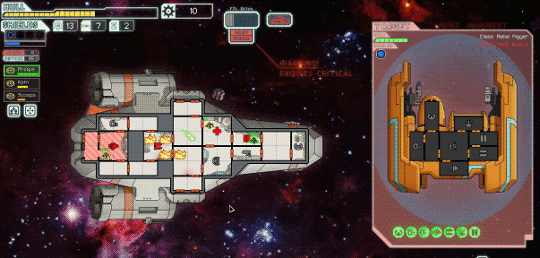Silksong & Monkey Island Meet Aliens: My Own Kooky Appendix N
By JimmiWazEre
Opinionated Tabletop Gaming Chap
TL;DR:
My own “Appendix N” blends Stephen King, Terry Pratchett, Alien, Robocop, Monkey Island, and Hollow Knight into a stew of survival, satire, exploration, and corporate dystopia. These influences shape how I run games: players face real risks, moral greys, teamwork challenges, and a world that keeps unfolding the more you explore.
What Is Appendix N?
Back when, a million years ago when D&D first came out, one Gary Gygax included in the rules something called ‘Appendix N’. This was meant to represent something akin to his reading list to help nascent DM’s (who’d never seen D&D or any other RPG before) to understand the themes and vibes required to run D&D according to the intended vision of the authors.
Fast forward to today and it’s a neat little historical artefact for nerds to pour over and count off how many items they’ve personally consumed.
This week, I thought it’d be cool to share my own personal Appendix N (or perhaps ‘Appendix DMT’) for no better reason than to share a little bit about myself. This covers not on thematic things I like, but how these cultural artefacts guide my person GM style.
Let’s get crackin’!
Appendix DMT
The Gunslinger By Stephen King
The first book in King’s Dark Tower series is a favourite of mine, it tells the story of Roland Deschain, the last of the Arthurian Gunslingers, (essentially cowboy paladins) and his pursuit of the nefarious ‘man in black’ as he flees across the desert.
The book explores Roland in his anti-hero phase, where he continually has to struggle with the consequences of the sacrifices he makes (namely in other people) in order to achieve his ends.

I like the moral greyness here. The fact that there’s no easy ‘good’ option is something that I like to carry forwards into my games, making sure that my players don’t always get easy black and white choices in front of them.
IT By Stephen King
I read a lot of King, OK? Anyway, IT was the first King book I read, and I’ve always loved it. I love how Pennywise is presented as this mocking force of nature, but that his weakness (the unwillingness of his victims to be intimidated) is apparent from the start, and telegraphed in how he goes out of his way to ensure that his victims are always properly terrified before who goes in for the kill.
This is a great lesson for GMs, as it keeps games fair because it avoids designing arcs where players are spoon-fed the monster’s weakness at a pre-planned point, and instead leave it entirely up to them to connect the dots in their own time.
The other inspiration IT has upon me is the idea of the plucky underdog. At its core, this is an OSR principle, that an underpowered character can win the day not through raw toe to toe power, but through cunning and guile.
Mountain Survival By Edward Packard
I think this was my older brother’s - kicking about my childhood home in the late 80s. It’s a ‘Choose Your Own Adventure’ book about: “You and your pilot; Jake Mckay [iirc] are flying over the Canadian Rockies, when all of a sudden the engine begins to splutter.” What follows is an interactive story about the survival choices you make as you attempt to navigate the wilderness on foot and find rescue for yourself and the injured Jake.
Invariably, many decisions lead to your untimely death. I distinctly remember a brutal choice about climbing up either the left, right, or middle of a crevasse and one of the choices leads to a boulder falling and wiping you out mid climb!
Mostly though, the choices you make are logical and well telegraphed allowing you to make an informed decision, and this is a principle that I like to carry through to my game. The risks are real, often fatal - but never a gotcha, never (ironically) ‘rocks fall, you die’.
Moving Pictures By Terry Pratchett
Compared to the others in this list so far, this ones going to come out of left field a bit I suspect :) Thing is, I like comedy and satire done well. Now, I’m far from a comic master, barely a comic novice, but what I take from Pratchett’s work here is the sparing introduction of silly and tension busting NPCs.
Mr. “cut me own throat“ Dibbler, the sausage in a bun salesman is brilliant, introduced carefully and not over used - making him easily one of my favourite characters in the book and a golden inspiration for a handful of similar characters of my own. Such as Bombastic Barry, and his brilliant bazaar of bodacious baubles and bewitching bric-a-brac, a joy to play and reintroduce at least once per campaign as part of my ongoing ‘Barry-verse’.
Alien
OK, leaving books behind now and moving onto films - Alien is a massive influence on me, I find corporo-dystopias to be a really terrifying and interesting sandbox to explore, and the idea that the real monsters aren’t the creatures crawling around in the vents, but rather your fellow humans, screwing you over for a payday.
It’s bleak as hell, but I always like to hold onto this whole ‘the good guys are actually the bad guys’ trick in my back pocket for deployment from time to time.
Robocop (1987)
More corporate dystopia and now with a healthy dose of satire. Robocop is a masterclass of combining the two to great effect without compromising the integrity of the film. In fact, the satire only serves to underline the absurdity of the fascist corporate oligarchy that the American system has descended into.
Thank goodness that’s just a work of fiction though. Right guys? Right? FFS.
The Fellowship of the Ring (2001)
That whole Mines of Moria scene, dude… it’s easily the most tense element of the entire franchise for me and it reduces our hard as nails heroes to mere mortals, running for their lives as they face the consequences of their mistakes.
Hell, even Gandalf ‘dies’, underlining the whole new ethos that I bring to the table every time - my players aren’t invincible and sometimes running is not only necessary, but also tense and great fun.
The Secret of Monkey Island
Did you ever play this? Gem of an adventure game back in the 90s, I had it on my brother's Amiga. Easily one of my favourite games of all time - a classic that just keeps giving the more I go back to it!
But what do I take away from it for my GM style? Certainly not the linearity of the problem and solution loop, that goes against most of my GMing ideals, so I guess the key thing is its sheer irreverence, and parody.
Everything is a joke, normally grounded in pop culture. I think it's fine to take some of that and bring it into a game, so long as you don't over use it.
The other thing of course is Pirates! Definitely my favourite swashbuckling subject matter, and something that set me on a life long path for appreciating all things 1715 Caribbean!
World of Warcraft
I was deep down the WoW rabbit hole back when it first came out, up until the Cataclysm expansion where despite some cool new features, like instanced story telling, the game definitely started being dumbed down for the masses.
Which should tell you what I take from it; difficulty and the reliance on roles and teamwork to overcome threats. That's so much more interesting to me than modern games and TTRPG design which instead focus on these ‘one man army’ character builds.
If the problem you dish out as a GM can be solved by one PC’s character sheet in an instant, then the problem has failed to be interesting.
Faster than Light
I've lost so many hours to this one, it's a rogue-like where the idea is that the game is difficult and you're going to lose often, and each time you'll start again and have a blast. Learning, and getting better with each iteration.
For me, the key point to take away is that losing shouldn't be unfun. When players die, and have to roll up something new then it should feel like an opportunity and not a punishment.
How do I think you achieve that? Don't rely on deep character stories and arcs, let that stuff come naturally over the game. If there's no preplanned character arc to lose then players willingness to accept a new character is hugely improved.
Hollow Knight: Silksong
If you've not played Silksong or it's forebear; Hollow Knight then I pity you my friend! It's such a great example of a modern day metroid-vania.
But what is that and why's it relevent? Well, a metroid-vania game has a focus on exploration, hitting dead ends, exploring again, unlocking new solutions, backtracking and then using those solutions to progress at a previous dead end.
This is a framework we can carry carefully into TTRPGs. Not necessarily in the sense of locking progress away behind a predefined solution, but rather in keeping locations fresh and interesting for the players to visit many times and find something new each time - like a dungeon where the players return later with new knowledge/items, revealing paths that weren’t options before.
Conclusion
So that's it - my appendix N. What's yours? Answers below the line, folks. I look forward to reading them.
Hey, thanks for reading - you’re good people. If you’ve enjoyed this, it’d be great if you could share it on your socials - it really helps me out and costs you nothing! If you’re super into it and want to make sure you catch more of my content, subscribe to my free monthly Mailer of Many Things newsletter - it really makes a huge difference, and helps me keep this thing running!
Catch you laters, alligators.








Here’s the problem, if you grew up in the 90’s or later, and have only ever played 5e - it’s likely that your only detailed point of reference for what a dungeon experience is like comes from video games - maybe something like Zelda (Ocarina of Time - best game ever made. Fight me!) The issue here is that they teach the player that a dungeon is this linear place, to be solved in a set way, with battles in predefined places.